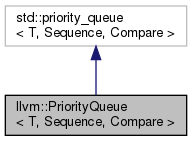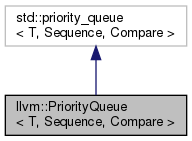PriorityQueue - This class behaves like std::priority_queue and provides a few additional convenience functions. More...
#include "llvm/ADT/PriorityQueue.h"


Public Member Functions | |
| PriorityQueue (const Compare &compare=Compare(), const Sequence &sequence=Sequence()) | |
| template<class Iterator > | |
| PriorityQueue (Iterator begin, Iterator end, const Compare &compare=Compare(), const Sequence &sequence=Sequence()) | |
| void | erase_one (const T &t) |
| erase_one - Erase one element from the queue, regardless of its position. More... | |
| void | reheapify () |
| reheapify - If an element in the queue has changed in a way that affects its standing in the comparison function, the queue's internal state becomes invalid. More... | |
| void | clear () |
| clear - Erase all elements from the queue. More... | |
Detailed Description
template<class T, class Sequence = std::vector<T>, class Compare = std::less<typename Sequence::value_type>>
class llvm::PriorityQueue< T, Sequence, Compare >
PriorityQueue - This class behaves like std::priority_queue and provides a few additional convenience functions.
Definition at line 28 of file PriorityQueue.h.
Constructor & Destructor Documentation
◆ PriorityQueue() [1/2]
|
inlineexplicit |
Definition at line 30 of file PriorityQueue.h.
◆ PriorityQueue() [2/2]
|
inline |
Definition at line 36 of file PriorityQueue.h.
Member Function Documentation
◆ clear()
|
inline |
clear - Erase all elements from the queue.
Definition at line 76 of file PriorityQueue.h.
Referenced by createILPMinScheduler().
◆ erase_one()
|
inline |
erase_one - Erase one element from the queue, regardless of its position.
This operation performs a linear search to find an element equal to t, but then uses all logarithmic-time algorithms to do the erase operation.
Definition at line 47 of file PriorityQueue.h.
References llvm::find().
◆ reheapify()
|
inline |
reheapify - If an element in the queue has changed in a way that affects its standing in the comparison function, the queue's internal state becomes invalid.
Calling reheapify() resets the queue's state, making it valid again. This operation has time complexity proportional to the number of elements in the queue, so don't plan to use it a lot.
Definition at line 70 of file PriorityQueue.h.
The documentation for this class was generated from the following file:
- include/llvm/ADT/PriorityQueue.h
 1.8.13
1.8.13